|

songs | interviews | photos | tours | boots | press releases | timeline
Next (US)
May 9, 2014
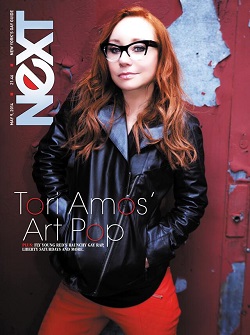
Selfie Reflection
After several years conquering classical music and theater, Tori Amos returns to pop music--and her gay fans--with a deeply personal album.
By John Russell
photos by Santiago Felipe
What does Tori Amos mean to gay men? That's the question that keeps worming its way into my brain as I stare at the blank Word document that should be filling up with questions about Amos's 14th studio album, Unrepentant Geraldines, the night before I'm scheduled to interview her.
 I've always thought that people who say that Amos's music is for dykes have it wrong. Ani DiFranco, the Indigo Girls, Tracy Chapman--that's music for lesbians: folkier, earthier, crunchier, just as raw and emotionally charged, but significantly less glam. I'm talking broad generalizations here, and I'm sure Amos would tell you that her music, that all music, is for everyone. But some music, for whatever reason, seems to speak directly to certain people, and Tori Amos's music speaks to gay men.
I've always thought that people who say that Amos's music is for dykes have it wrong. Ani DiFranco, the Indigo Girls, Tracy Chapman--that's music for lesbians: folkier, earthier, crunchier, just as raw and emotionally charged, but significantly less glam. I'm talking broad generalizations here, and I'm sure Amos would tell you that her music, that all music, is for everyone. But some music, for whatever reason, seems to speak directly to certain people, and Tori Amos's music speaks to gay men.
Sure, womanhood--along with religion--has been the thread that's tied her body of work together going all the way back to her 1992 debut album, Little Earthquakes. But anyone who has ever been to a Tori Amos show can attest: her audience is, if not predominantly then at least significantly made up of gay men.
But when I try to think about why Amos is a gay icon, it feels a bit like groping around in the dark. Despite hit remixes by the likes of Armand van Helden and Peter Rauhofer, she's never been a dance floor diva. She's written extensively about enduring personal tragedy, though she's never been a tragic, train wreck figure like Judy Garland or Whitney Houston. Her music doesn't inspire the same kind of drag as Madonna's or Gaga's or Beyonce's. Still, that hasn't stopped New York queens like Erickatoure Aviance and Paige Turner from trying. "Ironically, the only song I ever feel like I bombed on in drag was 'Cornflake Girl'!" recalls Turner, who's hosting an Unrepentant Geraldines release party later this month. "I'd be lying if I said I never was a cornflake girl. [She] had lyrics that took several listenings to really get under your skin in the best of ways."
We may never hear "Bouncing Off Clouds" or "Raspberry Swirl" out at a club, but I'm willing to bet most gay guys played Boys For Pele and From the Choir Girl Hotel almost non-stop in high school. And Amos' influence on queer artists is undeniable. Last month, when Next Magazine was compiling our list of 25 albums every gay man should hear, every musician and DJ we approached included Little Earthquakes in their lists of suggestions.
"She's a huge influence on me. Probably my main influence," says out singer and illustrator Dan Paul. "Her emotional rawness, her confessional style of writing--I think every gay man has at least one major confession that he's been sitting on for a number of years. Tori's ability to talk about the unspeakable and also her strange way of being able to take confession and turn it into a thing of abstract beauty--she transcends pop music with poetry and you just don't see a whole lot of that."
Robert Maril, one-third of the queer alt-country trio Kings puts it most succinctly. "With Tori, we've always known she's on our side."
 It's a sunny Monday afternoon when Tori Amos, along with her stylist-cum-assistant, arrives at the small office near Penn Station where we're meeting for our interview and photo shoot. Even in five-inch candy-colored Jimmy Choos that look like something from Willy Wonka's factory, she's a tiny lady in a motorcycle jacket and--there's just no other word for them--fierce red leather pants.
It's a sunny Monday afternoon when Tori Amos, along with her stylist-cum-assistant, arrives at the small office near Penn Station where we're meeting for our interview and photo shoot. Even in five-inch candy-colored Jimmy Choos that look like something from Willy Wonka's factory, she's a tiny lady in a motorcycle jacket and--there's just no other word for them--fierce red leather pants.
Amos is in town promoting her new album. Earlier today it was WNYC's Sound Check; tomorrow it's Katie Couric, followed in the evening by a show and in-store signing at Rough Trade in Brooklyn. It's a packed schedule--of interviews, TV and radio appearances and meetings--that doesn't leave her a lot of downtime, though she has managed to post a few candids and "unrepentant selfies" to her official Instagram profile while she's been in the city: Amos in Times Square in her now-ubiquitous cat-eye glasses; a street view of One World Trade Center; the crew unloading her Bosendorfer baby grand piano on stage at Rough Trade.
Despite her demanding schedule, Amos is in a great mood today. She and her team have just come from lunch and she seems open and relaxed. She's all smiles, chewing gum and, it must be said, having a bit of a kiki with our photographer.
"We thought we'd give you a little leather," she says, giving a sassy little snap of her fingers.
Photos come later, though. For the next 20 minutes, she's all mine.
The new album marks Amos's return to pop music. For the past few years her work has moved away from contemporary songwriting, delving instead into classical themes with her 2011 song cycle Night of Hunters and orchestral arrangements of her earlier songs on 2012's Gold Dust, both released on classical music label Deutsche Grammophon. She's also spent the past few years collaborating with playwright Samuel Adamson on The Light Princess, a musical that premiered last fall at London's National Theatre.
"I didn't know where I was headed," Amos says of that period of her working life. Those projects represented not only a different type of material, but also a different way of working than she was used to. "I had collaborators that I hadn't had before, in numbers that I hadn't had before," she explains. "I was in worlds whereby people were working very diligently and the discipline was high, the bar was high, but there was a lot of exchange of thought. So there was a freshness that was happening. Sparks, ideas that were coming to me--it was a really potent time, the last three, four years."
Those sparks ignited in Amos's downtime, eventually becoming the songs that make up Unrepentant Geraldines. "I didn't sit down and plan to write a pop record," she says. She came to think of this material as "secret sonic selfies," material that she had the freedom to shape on her own when she needed to, without the pressures of a release date or the demands of a major label contract to contend with.
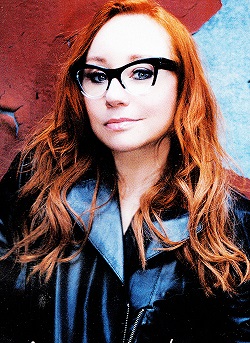 "Songs would come at different times over the last few years. It was just a form of expression," she recounts. "I was just living my life as an artist doing other projects, and these things, through the last few years, would be there helping me deal with my personal life, helping me deal with my professional life, and I didn't share it with anybody. So this was something where songs could bubble away. They could be on a back burner. The sauce could be simmering--for a couple years, some of the songs. And I would be able to get back to them and make some changes and live with them."
"Songs would come at different times over the last few years. It was just a form of expression," she recounts. "I was just living my life as an artist doing other projects, and these things, through the last few years, would be there helping me deal with my personal life, helping me deal with my professional life, and I didn't share it with anybody. So this was something where songs could bubble away. They could be on a back burner. The sauce could be simmering--for a couple years, some of the songs. And I would be able to get back to them and make some changes and live with them."
The result is a very personal album, even by Amos's standards--this is, after all, a woman whose work has dealt with her own rape and miscarriage in the past. The "selfie" comparison makes sense. The 14 songs on Unrepentant Geraldines are snapshots of the singer's life not unlike the ones she's been posting on Instagram recently, though more revealing. The album was also heavily influenced by visual art. The title track was a reaction to a 19th century etching of a penitent woman hung in her house in Ireland by a friend, and the work of Paul Cezanne influenced "16 Shades of Blue," a song about the crisis Amos went through leading up to her 50th birthday.
That panic about aging, about worrying that you're past your prime, I tell her, is something that I think a lot of gay men can relate to.
"When you say 'gay men,' there's--a judgment that can happen culturally, a projection," she says. "Some of my contemporary straight men--we can name a lot of people that are very much thought to be at the height of their magical powers. Whereas women--particularly in the music industry--at 50 and up, aren't getting those front-line contracts."
The wake-up call for Amos came, she says, when she realized that she herself did still have the opportunity to make music. "There was something about not taking on these ideas of what 'past your prime' means. I started thinking, No. I can create things, still, that can be potent and powerful. But I can't try and create like I did when I was 28. I need to create from a place now. This is valid now. And then that started to be really vital. There's a force with it."
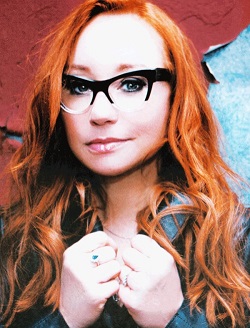 That force is on display the following night at Rough Trade. Amos takes the stage in lime green leather pants, a flowing green top and, of course, glasses to play a short set that is being streamed live on Spin.com. It's a preview of the shows she'll be doing this summer on her world tour--"Eighty shows! Can you fucking believe it?"--just her and a piano, the way she toured for much of her early career.
That force is on display the following night at Rough Trade. Amos takes the stage in lime green leather pants, a flowing green top and, of course, glasses to play a short set that is being streamed live on Spin.com. It's a preview of the shows she'll be doing this summer on her world tour--"Eighty shows! Can you fucking believe it?"--just her and a piano, the way she toured for much of her early career.
Looking around at the show, I recognize several gay media types. A gay couple sits, arms around each other, up on the mezzanine. I find myself thinking again about what Amos means to gay men.
"In some ways it's not my business," she'd told me the day before. "Because whatever that is is your experience."
If she has a message specifically for gay men, she says, it's the same one she's always had for women. "What I try and encourage gay men to do is embrace their spirituality, and to see the sacredness--a sacred sexuality. Spiritual eroticism. So you have your sexuality, but you have your spirituality, and they don't have to live in different compartments in your being. There can be an integration, and a sacredness."
Amen to that.
~ ~ ~
"I have to start seeing myself as all the songs that I've ever been part of creating. That became who I was."
Exclusive outtakes from our conversation with Tori Amos.

On absorbing New York's arts scene:
This time, I don't get to do anything except interviews and perform and TV because that's just what this time is. But normally when I'm not on a promo run, then it's a different experience. I meet up with people, they take me--they expose me to things. I think that's the key: I have quite a few friends here, so they take me along.
On writing her classical song cycle, Night of Hunters:
When I got the call from Alex--Dr. Alexander Buhr from Deutsche Grammophon--I didn't really know what those steps were going to be, the next three years of my life. I understood on one level that what he was proposing had ramifications if I got it really wrong. So, doing variations on themes by the masters can really end everything for you, where you don't wanna ever, ever show your face again. It's just the one thing you don't wanna mess up! So I took it, I was consumed by it, did my research with it, studied hundreds of years' worth of music that he was sending to me. So he was giving me a crash course, even though I'd been at the conservatory when I was five. I hadn't immersed myself in classical music since I'd left school at 11.
On the difference between Unrepentant Geraldines and her more concept driven albums:
There is no concept with this. So it didn't come as a project. It didn't come as I'm making art. I was just living my life as an artist doing other projects and these things, through the last few years, would be there helping me deal with my personal life, helping me deal with my professional life, and I didn't share it with anybody. Always, in the past, there's not a lot of time before I'm sharing songs that I've maybe written on the road with another project, and then the musicians come in and I'm sharing. So this was something where songs could bubble away. They could be on a back burner. The sauce could be simmering, for a couple years some of the songs. And I would be able to get back to them and make some changes and live with them.
People expect very personal work from you. This album sound very personal.
What's strange is that it is personal, but it might not seem--it might seem that the others were done with characters. I think with Doll Posse, because there were characters, it might have been, Is she telling stories about other people's lives? Am I inhabiting other people's lives. Whereas this--Tash would say to me, 'This doesn't remind me of you in your--she didn't say this--"you in your blue period." But that's what she meant. She said, "Your albums, a lot of times, are you exploring something. Whereas this reminds me of everything since I can remember. Something from everything." And I think she was relating it to Scarlet's Walk and Under the Pink and those types of songs.
On exposing her daughter to her earlier music:
Well, it's kinda wild, because as she's getting older, I think she begins to listen to it on different levels. As a young child she would listen to the melodies and the rhythms. And now, the lyric content is becoming more important. She realizes that there's a mom and there's a musician, and sometimes for this project--well, all the projects, but for this project at a certain point the mom kind of said, the musician needs to go away, and take the skin off and dive in and write these songs. Because sometimes the songs will show themselves--something like "Wild Way," or something like "Oysters"--and the mom will say, You can't just shed the layers and get to some of these very emotionally raw states that you need to get to and be operating as a mom. So there were times during this process when I would take off, and Mark would say to me, 'You need to go chase these demons. Chase them down. Hunt them down.' And it's very difficult to do that for me when I'm in mom mode. Cause then you're exposing--even though she's 13 now, she's a bit older--still, once the songs are written and we're recording them, it's a different energy than when you're having to track them down. Because I can't just snap my fingers. Sometimes I have to take a pilgrimage. You put yourself in different situations out of a routine. Out of the routine of wife and mother, or daughter or friend, into not having to protect. And then that way you start taking those deep inward--you dive into the soul, you dive into your emotions.
On turning 50:
Women--particularly in the music industry--at 50 and up, aren't getting those front line contracts. I have one, yes--which plays into this. Waking up to that. Realizing this. Pulling myself out of looking down the barrel of a gun. Knowing the facts. Knowing that there aren't a lot of opportunities necessarily, but that you have to make your own luck, you have to find ways. And yes, to have that opportunity, it was a wake-up call. And Tash telling me, "You have to grab this with both hands, mom! Because if you're looking at this idea of 50, if you don't get your head around it and have some kind of"--she would laugh at me--"I don't mean a born again Christian moment, but you've got to have some kind of understanding, or what am I gonna look forward to at 50? What are you telling me? All my life you've told me, make something my own, go about it my own way, approach it uniquely."
I have to start seeing myself as all the songs that I've ever been part of creating. That became who I was. I wasn't a number anymore, although I can look at you and say, "50's great." But 50's only great because I went through a dark night of the soul process, taking on the judgment, this idea of being past your prime. Past your prime for what? Prime for wisdom? Because you don't get to have wisdom at 30. You might know many things, but there's a certain wisdom that only comes with experience. And experience isn't something we can buy, we can bottle up or change. And so I began thinking about, I need to collect all the songs that I've ever been a part of and that is who I'm gonna be on my 50th birthday. That's my structure. That's my shape. Not this [indicates her body]. And for the next 50 years I'm gonna build that structure to add on to it and anchor that into the earth.
On the connection women and gay men share:
A lot of gay men allow themselves to be more honest about their emotions than sometimes straight men. I feel like straight men, sometimes, aren't allowed, aren't in a situation where they can talk about what they're going through emotionally. Whereas gay men will allow themselves to discuss that. And a lot of times it's with straight women! These conversations where we're able to share. With gay men there's and exchange. I get a lot of letters and I get a lot of perspectives that do change the way I see things because of our discussions.
original article
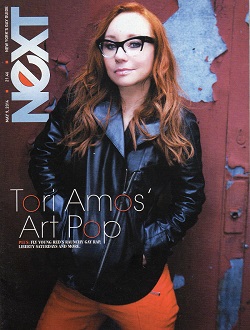 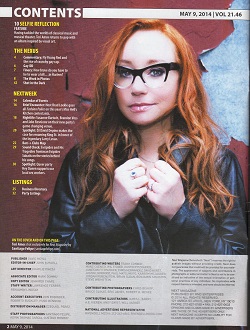
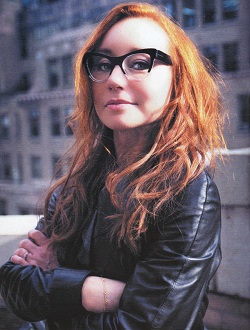 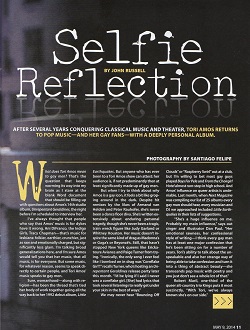
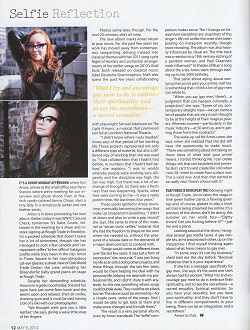
[scans by Sakre Heinze]
[source] [outtakes]
t o r i p h o r i a
tori amos digital archive
yessaid.com
|